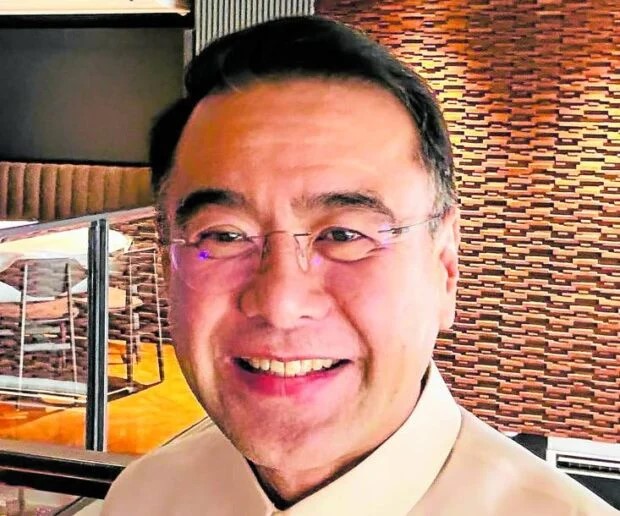
Rafael Consing Jr. PHOTO BY DAX LUCAS
MANILA, Philippines — In 1989, a youthful encyclopedia salesman approached Ricardo “Moy” Fernandez, then the treasury head of Multinational Investment Bancorp (MIB). MIB, recognized for raising capital in challenging markets and structuring intricate deals for corporate clients, encountered this enterprising salesman. Following a compelling sales pitch, Fernandez, now a board director at the Bank of Commerce, declined the encyclopedia but offered the salesman a job as an investment banker, impressed by the pitch and passion.
“I won’t buy your encyclopedia … but I want you to come work for me as an investment banker,” Fernandez told the wandering book salesperson.
Thus began the career of Rafael Jose “Joel” Consing Jr. as a finance whiz that saw him work for some of the world’s biggest banks, a couple of sprawling Filipino conglomerates, and eventually as head of the cornerstone economic policy of the Marcos administration, the Maharlika Investment Fund.
Door to door
“I remember those days clearly,” he told the Inquirer. “I had to park my car somewhere in Taguig, and go door to door, knocking on houses, selling them Lexicon encyclopedias.”
And even when potential buyers get hooked by Consing’s engaging salesmanship, the sale wasn’t quite done yet. The next phase was for credit examiners from the company to come visit the would-be buyer to make sure they had the wherewithal to pay the monthly cash installments totaling P12,000 for the 21-volume set—a princely sum in the late 1980s.
“I would attend classes in La Salle in the morning and sell encyclopedias in the afternoon,” he recalled. “Actually, I even missed my graduation because I was out working.”
Nowadays, the 55-year-old Consing is no longer going door to door selling expensive multivolume books, but he acknowledged a significant part of his current role as president and CEO of the Maharlika Investment Fund will still be a selling job.
READ MORE: Maharlika CEO Rafael Consing Jr. an ‘accomplished executive’
4 investment areas
He said he wants to sell the idea to the Maharlika board—which President Marcos is expected to complete in the coming days—of investing in four key pillars of the economy, which are considered high-growth areas that are simultaneously in need of massive investments.
These four growth pillars are the tourism industry, which needs to be developed further for the country to capitalize on the potential of tourists from around the region; the energy sector where more reliable and cleaner power is required by the growing economy; digital infrastructure which will help the country keep pace with fast-paced changes in technology; and what he describes as “agroforestry industrial urbanism.”
Consing is particularly excited about the last one, which will involve converting sprawling idle government land into agriculture- and forestry-linked industrial estates that will enable farmers to bring their produce to adjacent facilities that will process these into finished products and then transport them to local or foreign markets.
Higher capital base
To have the resources for this undertaking, Consing said it would be important to raise Maharlika’s capital base from the current P75 billion (from the contribution of the Land Bank of the Philippines and the Development Bank of the Philippines) to P125 billion once the national government pitches in its share, to the full P500 billion authorized by law.
The additional P375 billion will be raised from both foreign and local investors, he said, adding that he envisions a structure where even retail investors can participate in the growth potential of the fund by buying equity the way one currently buys primary shares of companies in the stock market.
He said more details will be rolled out next month when a high-ranking Philippine delegation attends the World Economic Forum in Davos, Switzerland—the same venue where President Marcos unveiled the Maharlika concept last year.
He preferred cash
“It’s never been done and that’s the beauty of it,” he said. “I think if they wanted to hire someone who’s doing what’s been done before, I’m not that person.”
If his investment acumen is ever questioned because of his humble beginnings as an encyclopedia salesman, how he parlayed his earnings from his first job into something more substantial should lay doubts to rest.
“I remember that I got a prize from the company for being able to sell seven encyclopedia sets,” he said. “They awarded me with a trip to Thailand.”
Consing said that, instead of taking the vacation, he opted to receive the cash equivalent of his sales incentive, and he invested the money in the 1989 initial public offering of a firm called Ayala Property Ventures Corp.
The company’s shares were offered to the public at P1 each and these were listed on the stock exchange a few weeks later at P2.18 apiece. That firm has since been known as Ayala Land Inc., among the most actively traded shares on the market, closing at P31.40 last Thursday.
“That was my first investment,” he said proudly.
Ice for Eskimos
A former colleague at MIB, investment banker Judd Gallares, recalled how everyone in the firm was amazed by Consing’s highly effective salesmanship.
“Joel can sell ice to an Eskimo,” he said, explaining that his enthusiastic sales pitches often resulted in record deals for the firm, whether he was offering clients equity or debt.
With many Filipinos still skeptical of Maharlika and a challenging global economic environment that is making investors increasingly skittish, Consing will have his work cut out for him.
Only this time, he won’t be selling encyclopedias to households or ice to Eskimos. This time, he will be selling the Philippine investment story to the world.
READ MORE: BIZ BUZZ: The first Maharlika chief